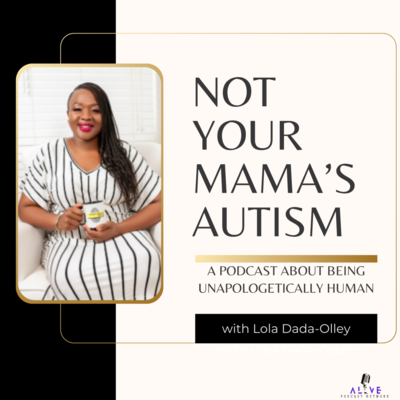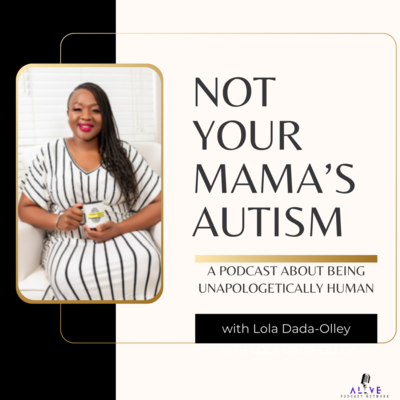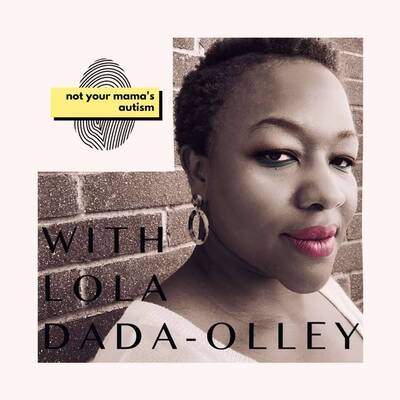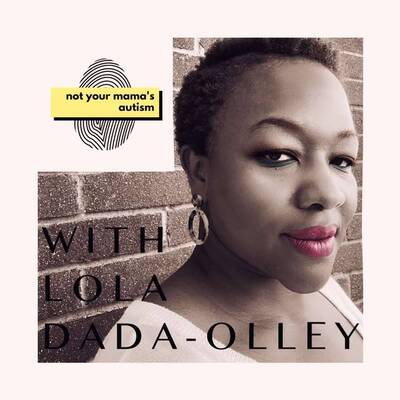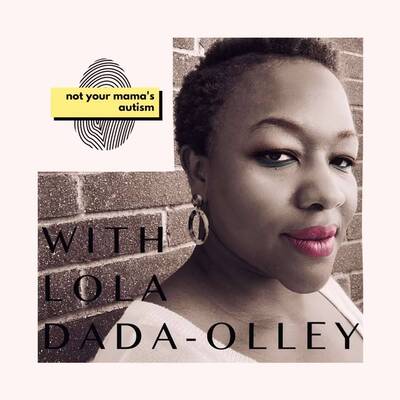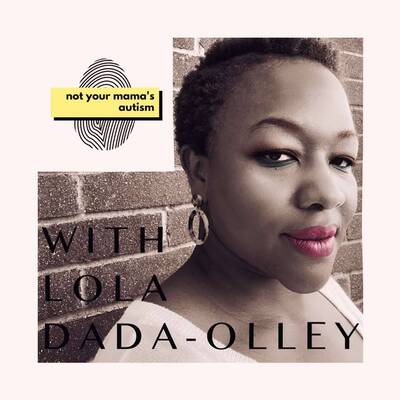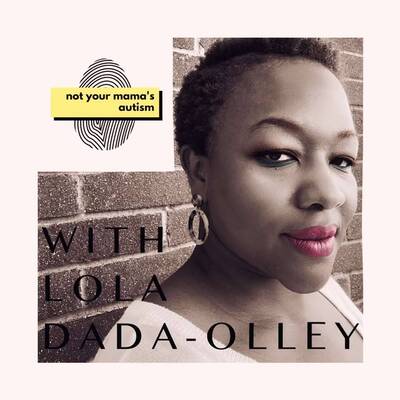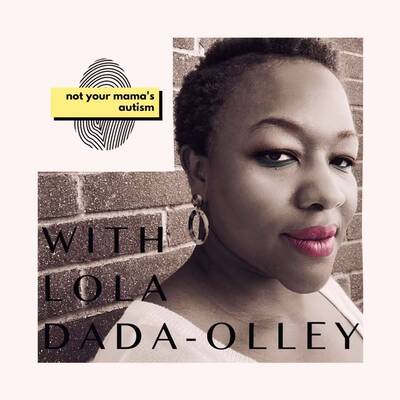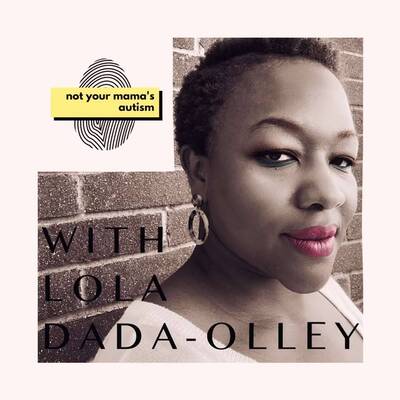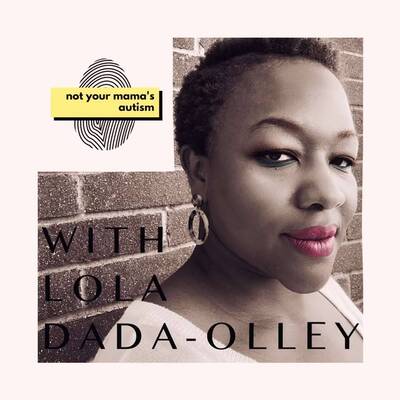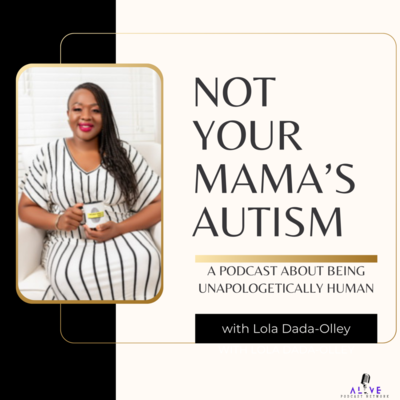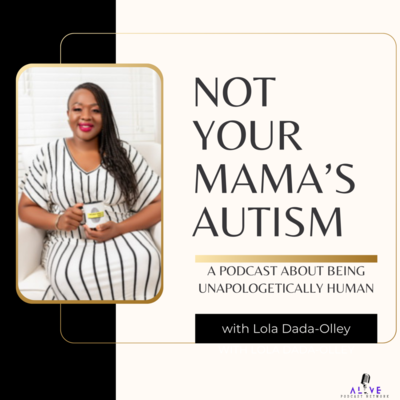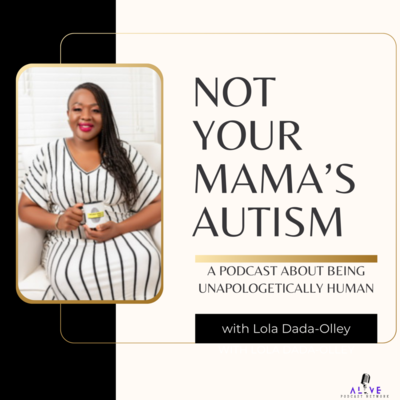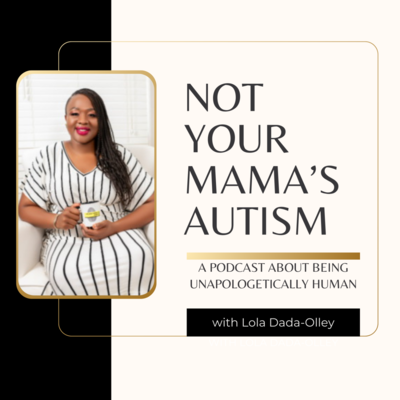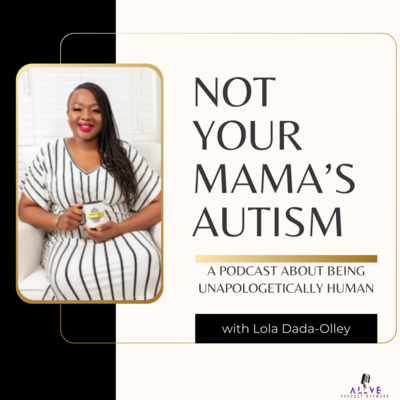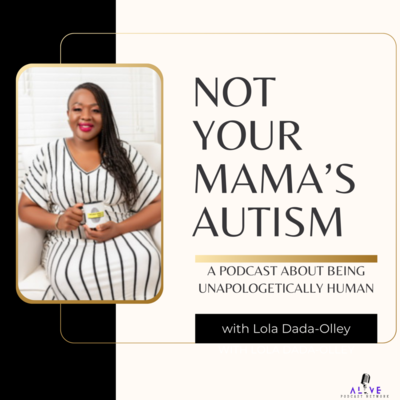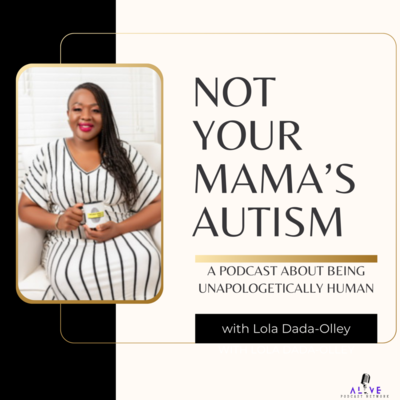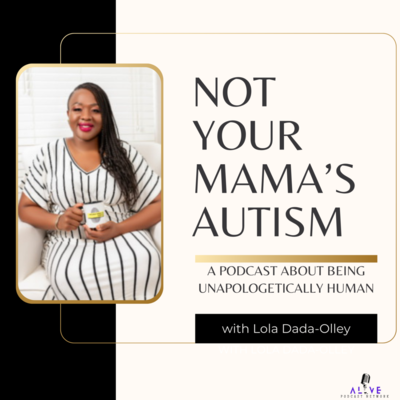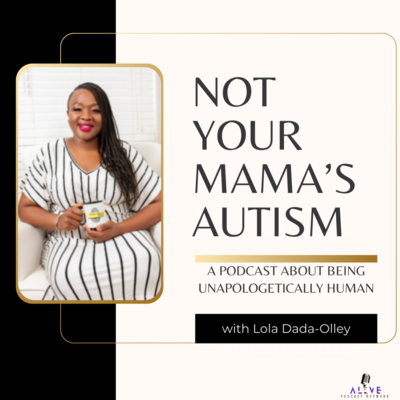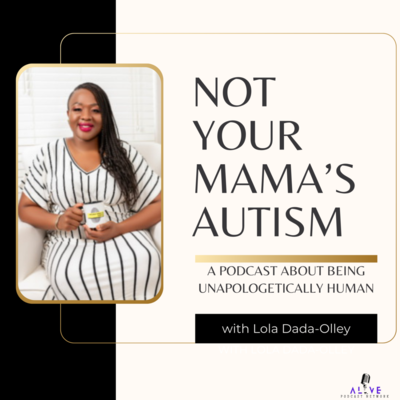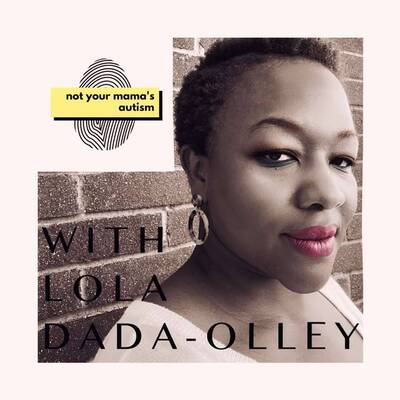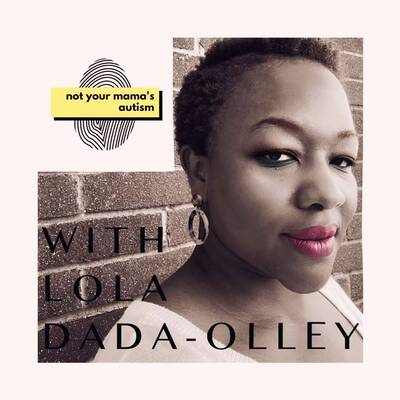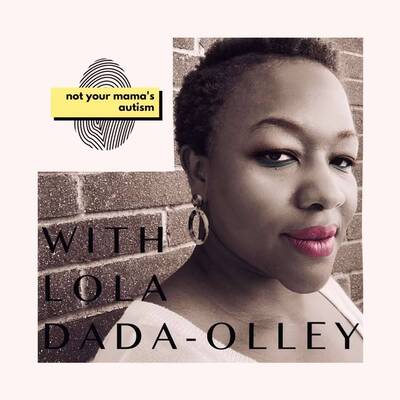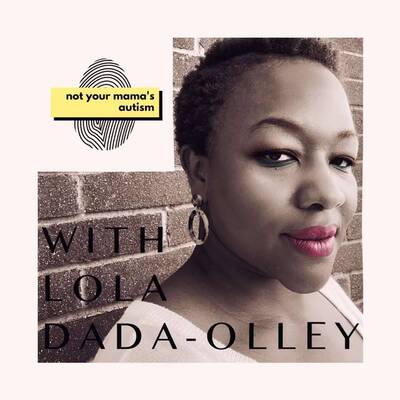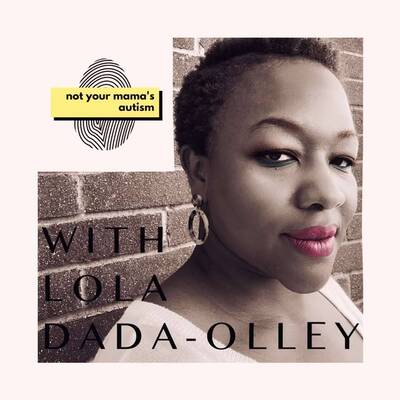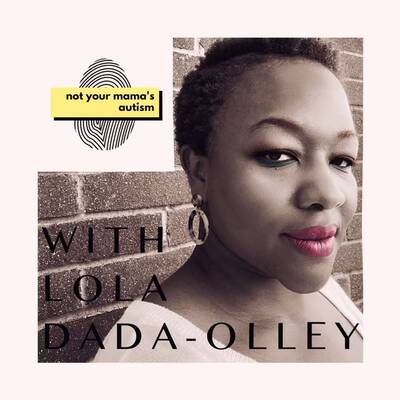Transcript
Lola Dada-Olley (00:02.364)
Larissa Heise, thank you. Thank you for being on the Not Your Mama's Autism podcast today.
Larissa Heise (00:10.317)
Thank you for having me.
Lola Dada-Olley (00:13.148)
So you are a licensed social worker. You are also a BCBA for those listening who don't understand what that acronym means. In these neurodivergent streets, it means board certified behavioral analyst.
I am going to really enjoy this episode talking to you about behavior. So let's talk about challenging behavior. But before we do so, let's do some level setting. Because challenging behavior means different things to different people. So what would you identify as a challenging behavior?
Larissa Heise (00:57.485)
I'm going to give you my personal definition and then I'm going to give you like what I think out in the world people are like generally having consensus on. Given the work that I do, I work a lot with family, families and very, a very parent centered model of support in the work that we do and some of the programs I supervise, very unique programs actually compared to maybe some other providers who are very family centric kind of approach to treatment.
I look at challenging behavior as being something that exceeds the family's ability to support. And that can mean different things for different people. I've had some families who are dealing with the more traditional definition of challenging behavior, which I'm going to share, but I've had other families who, you know, maybe it's not at a level of safety, but they are so overwhelmed. They still don't know what to do. And it's leading to
ER visits and things like that. But in terms of like what I think most people as a provider, right, most people would kind of agree upon in terms of challenging behavior are behaviors that are at risk of safety concerns. You know, generally we're looking at things where people are harming themselves, are at risk of harming others, are extremely dysregulated to the point where they're having a difficult time day to day.
in their lives, whether that's across settings. Typically we are seeing if somebody has kind of challenging behaviors or behaviors of concern, they're exhibiting them across settings and it's really impacting their quality of life usually in multiple ways. So it can look different, right, across age, situations, settings, but that's generally what I think, you know, the provider community is looking at. It's like behaviors that put people at risk of harm.
or limit their ability for quality of life.
Lola Dada-Olley (02:59.388)
Well, thank you for level setting. Cause I think in the past, it might have been what you just described plus behaviors deemed quote unconventional by perhaps neurodifficult. And that to me are not the type of behaviors that should be prioritized in any way as.
Larissa Heise (03:11.532)
Yeah.
Larissa Heise (03:18.111)
Yeah, no, there are behaviors that make people uncomfortable. There's behaviors that people don't understand, right? But when we're talking about challenging me, we're talking about, really, I want to anchor it to like safety, safety concerns and things that are impacting the individual's quality of life, not necessarily somebody's perception of quality of life,
Lola Dada-Olley (03:25.276)
Mm -hmm. Mm -hmm.
Lola Dada-Olley (03:44.091)
Yep. So, looking at that as the level setting, what trends have you seen in your practice concerning some of the most common types of challenging behaviors that people, caregivers, educators are experiencing, are witnessing, I should say?
Larissa Heise (04:08.469)
I think recently especially, feel like in last five plus years, there's been so many difficult things in the world that have impacted everyone. And we've seen quite a bit of increase in behaviors where people are at risk for immediate danger. I would say there's always different levels, Behaviors, a lot of people I talk to, they're like, comes out of nowhere.
Lola Dada-Olley (04:24.038)
Yeah.
Larissa Heise (04:39.105)
That's very unusual for it to actually come out of nowhere. Usually it builds up over time, right? So we usually see people start the lower levels of behavior of kids who, if they're unable to communicate in like a traditional sense, they have a difficult time getting their needs met. We're seeing behaviors where they're finding ways to get their needs met. People get their needs met any way they can, right? And that might include hitting, biting, kick -gagging, throwing things. lot of property destruction is typical.
crying as kids get older. Oftentimes we see if those behaviors aren't supported or we're not giving ways to get those needs met or teaching ways to get those needs met. We can see them intensify right and so. Kids get bigger. And sometimes depending on their individuals like. Skill level or ability to communicate.
Lola Dada-Olley (05:29.19)
Yeah. Yeah.
Larissa Heise (05:36.663)
they might still use those behaviors to get their needs met, but they're in a much bigger body now, right? They're adults or they're teenagers and they still need to find ways to get their needs met. And those behaviors, even if they're exactly the same as they were when they were younger, can be very different in terms of safety as people grow older. generally like those kinds of things. And I would say it's across settings. think, you know, different...
people in different places, like in home versus school, have different resources. So maybe there's more to support in different areas, but oftentimes, like, not always, but more often than not, we are seeing those more intensive behaviors across all different places.
Lola Dada-Olley (06:25.81)
So when you mentioned earlier that you said certain, some people say it quote, comes out of nowhere, but in your practice, you've actually seen that that's almost not, almost always never the case. Could you give me an example of maybe a trigger that maybe most people don't notice that after maybe you all have kind of traced back the steps, you've discovered that this particular trigger is something that.
Larissa Heise (06:53.122)
Yeah.
Lola Dada-Olley (06:56.413)
folks should look deeper into.
Larissa Heise (06:57.099)
Yeah.
I think there are triggers that think a lot of people pick up quickly, right? And then there's the sneakier ones. But a lot of people, can usually tell like, it's because I set a limit or I said, no, we can't do that right now. We have to wait. Like those are common things or, you know, things like that. But I feel like if somebody has like a complex sensory profile, a lot of people assume
Lola Dada-Olley (07:09.702)
Yeah.
Larissa Heise (07:29.217)
behaviors are, that's attention. I will say this, attention is not a bad thing. I always try to reframe that for people like attention is connection. People are seeking connection, maybe they're doing that in ways that maybe want to shape that to a different, you know, that's not going to harm somebody. But a lot of times, sensory needs are often overlooked attachment. I think a lot of people overlook like a lot of individuals.
who have autism, people are just looking at autism and not looking at other co -occurring mental health needs, especially even for little itty bitties of like, hey, if they were moved a lot or they were adopted or they don't know how to connect, maybe it is related to autism, they just don't know how to connect or you don't know how to connect with them, right? We don't know how to like bridge that.
that difference, neurological difference, like kind of join each other. A lot of times that's happening more than I think people realize and they're kind of thinking,
it's attention. I'm like, no, no, attention is important. Like, let's talk about that. Like, what does that mean? Like, what are our relationships like? So yeah, common triggers that people don't always think of is like that relationship with other people. Having like a solid foundational relationship can make a big difference. And sensory needs, especially as people sensory needs get more complex. That gets tricky.
Lola Dada-Olley (09:06.396)
So can you give us an example of a situation where maybe a sensory challenge or a sensitivity may grow more complex as a person grows up?
Larissa Heise (09:23.383)
grows more complex.
Lola Dada-Olley (09:26.47)
or just, like for instance, I can give you an example in my own life with my son. So I have two babies on the autism spectrum, one now is a preteen, the other one's a teenager. So they don't want me to call them their babies, I'm sure, but they will always be my babies. I remember when my son started middle school, he used to always, he...
Larissa Heise (09:28.587)
Yeah, I'm sure I think I'm gonna do it. Sure. Yeah.
Lola Dada-Olley (09:52.882)
order to center himself. He likes the feel of jumping. So we got this big trampoline outside and as he's growing up, he used to say in very technical terms, Mommy, I need to get my wiggles out. I said, okay. And then I think he was starting seventh grade. Yeah, I thought that was fine to say. I think when he started seventh, he just started eighth grade today actually.
Larissa Heise (10:11.117)
I mean, I still say that.
Lola Dada-Olley (10:20.146)
But I think when he was entering middle school, so he was entering sixth grade and I said, Baby, you want to get your wiggles out? He said He goes I don't call it wiggles. I'm getting centered And I said Okay, I stand I stand corrected I stand corrected But I do wonder what the older teenager slash young adult
Larissa Heise (10:35.271)
Sure. Okay.
Lola Dada-Olley (10:49.404)
version of my son when he needs to feel centered and there's not a trampoline nearby. So I'm starting to get him to think of alternatives that could aid him in getting centered so that he's not so sensory seeking that he must find a trampoline. You can imagine if he's in an office setting, he's in a school, if he's in a college lecture room, if he's just...
Larissa Heise (10:56.236)
Hmm.
Larissa Heise (11:01.623)
Yeah.
Larissa Heise (11:05.73)
Yeah.
Lola Dada-Olley (11:16.476)
taking a walk in nature and he suddenly feels that need to feel centered. So that's one example of what I'm thinking of how sensory needs may become more complex and change over time as someone literally grows up.
Larissa Heise (11:27.607)
Yeah.
Larissa Heise (11:32.023)
Well, I think too, you know, especially in the example you give, like...
Larissa Heise (11:40.063)
I think that honestly, I love that example because I think it's just a good point of like how we approach supporting people learning about their own needs and like how to if, if you know, if he has a good understanding of like what his needs are in order to regulate in order to become centered, which I love, whether it's wiggling or, know, you know, if he has an understanding of that, then, you know, then we can look at the problem solving, like what do you need to
Lola Dada-Olley (12:00.923)
Yeah.
Larissa Heise (12:08.907)
meet that need either fully or in part, depending on what settings you are. And I think a lot of individuals when they're, you as they grow, they don't always have that support or they don't have an understanding always of like, and it's like a learning process, like everybody, right? Everybody as we grow up, we are trying to figure out what our needs are, you know, and I always say to like, everybody has sensory needs. I don't think we're always aware of them. Obviously, autistic individuals are like,
they have a larger need or have a more acute need oftentimes that they need to attend to in a lot of ways, whereas neurotypical people, we might not just think about it, but we have little things that just maybe aren't as interfaced sometimes. But yeah, I think that does become the trick as we grow older, if our needs are less able to be met in different ways.
Lola Dada-Olley (12:42.938)
or more visual need, like it's more obvious.
Larissa Heise (13:08.459)
settings or less socially acceptable. Sometimes, you know, that's the barrier to or just even like honestly, I was even thinking more basic of like, sometimes people like, I think this is what this person needs. I don't know, we're trying to help them figure it out. And like, that can be just tricky in and of itself. If especially if sensory needs are changing over time. So a lot of people
do have very consistent sensory needs like through their life, but other people, they change, like they change and what they need to regulate. Or they're very different in different situations, like some situations, like I need more input, whatever that input looks like in others, it's like I need to stop and I need to like unwind and kind of have some quiet. And so yeah, just, you know, as life gets more complicated, it's hard to know, it's hard to know, even at, you know,
I everybody kind of goes with that in some ways, but like add that other layer, right? Of like, okay, what do I need to do to take care of myself and to make sure I'm supported and not just in my own home, right? When I'm out and trying to be part of the world. Yeah, it just, I honestly, I don't even think I have a better example. I was like, no, I love that. Cause it's...
Yeah, it's just, especially when it's physical regulation, like to be able to like move and so yeah, just gets more complicated, like I think as we get older, so.
Lola Dada-Olley (14:43.384)
life just gets more complicated as you get older. I think there's this funny song that someone introduced to me and my husband years ago. It's out of Nigeria. Our family's originally from Nigeria and it's the loose translation is basically that adulthood is a scam.
Larissa Heise (14:46.112)
Yeah.
Larissa Heise (15:05.728)
You
Lola Dada-Olley (15:06.45)
I think there's a little bit of truth to that. There's some truth to that. So what do, in your practice, what are some things that you see that people commonly get wrong when it comes to challenging behavior? So some common misconceptions in this space.
Larissa Heise (15:10.157)
Yeah.
Larissa Heise (15:37.025)
I think one of the most common misconceptions is, and I don't think people do this on purpose, but a lot of times, every, you know, we're all human, right? We want to make sense of what we're seeing. And so a lot of times they're like, well, I saw it with this kid. So this was what's happening with this kid. And even within a family unit, right? Like, well, you know, the brother did X, so he's doing the same thing. And you're like, or like, I went through the same thing.
kind of saying, well, I know that's what I need. That's what it's like we, we don't sit and really look at the situation as a whole, and really kind of evaluate the individual's needs. We oftentimes, I think it's honestly like we do this also as way to empathize with like, well, this is what I think they need to like, I'm trying to help. Like, it's not, it's not without good intention, as I guess when I'm saying, but people think like,
They kind of fill in the blanks without really looking at the whole picture. And they try to put things in place to support that individual with good intentions. And they just sometimes miss the mark or sometimes make things worse unintentionally. Where they're like, I thought I was helping.
It was nice. I love the effort. Good intentions does count, but we also want to really put that person in the focus of like, there's a saying that I'm thinking of, it's not what I think you need, it's what you think you need. Do you know what I mean? not, it's what really dig down of what they're trying to, what need they're trying to get met in that moment.
without trying to put too much of our own bias, our own fill in the blanks, kind of, it's kind of like do the work and let's like really dig in and get a full understanding. There's somebody in the ABA field who says, Dr. Hanley who talks about like, I'm not gonna try to change anything until I fully understand your needs and your behavior because
Lola Dada-Olley (17:30.087)
Yeah.
Larissa Heise (17:50.795)
you know, for if we don't have an understanding, yeah, there might be things we have to put in place to just be safe. But like, we're not we're not going to teaching new things or doing new things until we really understand where that's coming from is it's going to fall flat or be frustrating for the person. Right. And learning new things is already frustrating, even when it is a valuable skill, let alone something that they're like. That's not what I need. That's not what I need.
Lola Dada-Olley (18:16.292)
That may not come naturally. Yeah.
Larissa Heise (18:20.529)
so I think that's the most common thing of like, try and really to step back and say like, this is a need. Like, and it's not about me or any, like it's what does this person need in this moment? And am I really looking at all the factors and some, and that's hard. I'm not saying that's an easy thing to do, but like really evaluating, and really digging into like, what, what do they need in this moment? What's driving this?
Lola Dada-Olley (18:51.218)
So the build upon what you said, right, of the importance of trying to understand the fullness of the situation before you introduce the behavioral intervention.
particularly for folks on the spectrum who may have communication challenges, who may be minimally speaking.
Lola Dada-Olley (19:19.698)
How do you approach triggers? Is the goal to try and separate them from triggers as much as possible so they don't come into contact with them? Is it the goal to knowing that it's going to happen, that trigger's going to come to work more on that incremental approach? Is it some mix of the two? How do you approach those situations where it's difficult for them to communicate?
you the fullness of the situation.
Larissa Heise (19:51.415)
Yeah. So that's a great question. think, yeah, that's, a lot of it is like from, this is more from my behavior analytics, analytic perspective. If I were gonna put a hat on me right now, sometimes I find myself like, being in both worlds, I find myself kind of like blending their approaches, but this is definitely more kind of like in that behavior analytic realm.
Lola Dada-Olley (20:06.556)
Mm
Larissa Heise (20:23.166)
There are lots of different ways, one, will say this, there's lots of different more technical things we could dive into and like talk about like how we evaluate that. But I don't want to like bog people down with that. What I will say is there's different levels of assessment and depending on the intensity, the complexity, I might choose different levels of assessment to ensure that the way I'm assessing
and the depth of which I'm assessing is really capturing everything that I need to capture and understand. And like you said, there's different ways to, I assess, there's also different ways to intervene. And I think as you work with individuals, more and more there's a safety risk, also just what's gonna be the most effective for each person, So it's always individualized. It's always like, what's gonna kinda click for them, what's gonna make the most sense for them.
But I will say that as we get into more and more extreme or unsafe behaviors, we do have to approach it in a more gradual and thoughtful way. Because if I'm working with an individual who's six foot two, 300 pounds, who doesn't have vocal communication, who has needs that they need to get met,
there's serious risks to myself and to that individual depending on what the behaviors are, right? So I need to be very thoughtful about the interventions we're utilizing. And they do need to be gradual because you don't want to overwhelm that person to the point where they are feeling frustrated. The goal should not be to hit a 10. You know what I mean?
I feel like the people within our fields who are more experienced with working with intensive behaviors, they understand that if we're doing things effectively the way we want, we won't hit a 10, right? Of course, we always prepare for emergency kind of situations, but if we're effectively supporting that person, we should be seeing positive change or supporting them at a level that they can handle and manage.
Larissa Heise (22:40.309)
And oftentimes when we're providing support, we have kind of a short term goal of like, what's going to help them right now and what's like a skill they can do right now. And like a long term goal that of course is going to like use that gradual approach. So I'll give you an example. Like if you have somebody that you work with that or that you know who even hearing the word no is an immediate trigger for like intensive
challenging behaviors, unsafe behaviors, where there's a of safety risks going on. We might have an immediate plan of like, okay, maybe we say not right now because the word no is so hot, so triggering, right? But we do still wanna work on long -term of like helping that person. I'm not gonna say that nobody's ever gonna love the word no. But like at least.
be able to respond differently or use different tools if that word comes up in conversation, right? So like that would be a long -term goal that we're gonna gradually work towards versus like, what do we need to do to support right now to make sure that they feel regulated? And I think that's the other, like to your earlier question of what kind of tricks people up. I think a lot of times when we're supporting these kinds of behaviors, people think about the right now. What can I do right now to help the situation?
but they forget about the later of like, yeah, you're right. Right now is important, but like, if we just keep doing the right now thing, they're not like people aren't gonna learn the skills that they need to be successful later, right? And they get confused about like, how do we teach that in a way that's safe, in a way that's supportive, in a way that, you know, meets their needs and keeps everyone safe. Like that's, that can be tricky. Yeah.
feel like I went a little bit on a tangent on that one.
Lola Dada-Olley (24:32.572)
So.
No, So when you talk about things being tricky, can you tell us an example of how when a certain strategy was going well for a length of time until it no longer started being effective, how did you help that person?
Larissa Heise (24:54.059)
Yeah,
Larissa Heise (24:58.635)
Yeah, think, honestly, I can think of a few, a few times because I do think that like, I think that's an important question because that does happen because we're again, we're all human things change. things change. Like you're like, okay, like that's not working anywhere. you know, and some individuals, they like, yeah, I get what we're doing here. I don't like it. Like, like that's not, we're not going to do that anymore.
Lola Dada-Olley (25:03.676)
Yeah. Yeah.
Larissa Heise (25:28.343)
So I'm trying to think of a specific strategy. I'll think of something real, real like kind of like a simple intervention that we did, like nothing, nothing crazy. know, difficulty transitioning into school. Okay, the first five minutes of the day, as soon as you get in, you can have some free play time and then like kind of transition into activities, right?
was gone, gone. You know, it was rocky at first. I was like, what's going on? always say people, people get confused when you change the rules on them. So they're like, I don't know. It's then, you know, kind of get used to it. Okay. It was working. It was going great. well, in this, in the situation I had, you know, they started, having the same toys at home that they had at school. This is a littler, not a little like an elementary,
kid I was thinking of, so they didn't care anymore. That's a basic example. I will say there's other times where you're like, I've seen things work for like a year and we're like, what happened? Like what changed? So usually if something changes, I look at first of has there been anything like, let's look at the environment, like what are we missing something? Did something else change that we just weren't paying attention to? Like maybe we didn't notice it, but
the individual noticed it because they're kind cute into that. And kind of look at that first and foremost. If we're like, really not sure what, we're not sure what changed. Sometimes we have to go back to the drawing board and say, okay, let's reassess what's going on here. Other times I will say of like, we miss something that happened, we just didn't think about it and maybe it wasn't.
as noticeable to us, but it was very noticeable to that individual. We have to go back and account for that and say, hey, oops, like, you know what, we're going to have a special thing at school when you get in here versus like the same thing you have at home or like, you know, things like that. So I guess what it always comes back to, like, I expect that to happen sometimes. If it's happening frequently, then I think like I would evaluate, hey, are
Larissa Heise (27:54.049)
Are we missing the core need? Are we only meeting part of the core need? Sometimes people are only addressing part of the need. And so sometimes the other part, if, to think of a good example, if I want to do something because, like I want connection with another person and it's a sensory need, if I'm trying to teach a different skill and I don't hit on both of those things, again, people find a way to get their needs met.
so sometimes if it's like happening frequently or rapidly, it's not working. might say, Hey, let's, we must be, we might be missing something. Let's really kind of think about this. But if it's like, Hey, this has been working for a while. More often than not, something has changed that we haven't caught on to. and if we miss it, then we might have to just evaluate, reevaluate from the beginning. That's definitely happened to, yep. We're all, we're all changing people. Right. So.
Lola Dada-Olley (28:51.73)
Yeah. So could you tell us a little bit about those use cases that made you want to go back to the drawing board? What did they have in common that made you think, OK, let's go back to the Genesis? I'm just curious.
Larissa Heise (28:52.673)
gonna... it might happen.
Larissa Heise (29:08.525)
Can you repeat your first part of your question? so sorry.
Lola Dada-Olley (29:11.434)
no worries. So along those lines, you said there were occasionally there'll be a use case where you now have to go back to the drawing board and kind of reevaluate. what do those maybe small -ish cluster of cases look like? What do they have in common that makes you think, OK, let's go back to the genesis and kind of figure out what was going on.
Larissa Heise (29:26.178)
Yeah.
Larissa Heise (29:40.194)
Yeah.
A lot of the individuals where that is happening, I think there's usually a, there's a trend, there is a trend of like a couple of things that, that may be going on. One, the most common one is we strayed from the plan. I will say of like, and we just didn't realize it, like people, or they tried to do things, change things too quickly. So that one's usually something like as, as a professional, we're able to catch.
Somewhat quickly, want to say. Other times, everybody's on point. Everybody's like, no, we are doing this. We're consistent. We loved the plan. We wish we could still do the plan. And a lot of times with those individuals, there's co -occurring needs that are often happening that we want to evaluate the whole person. is complex. There's different levels to it. when we go back to the drawing board, we look at.
Lola Dada-Olley (30:38.226)
very.
Larissa Heise (30:42.999)
How are they medically? Has anything medically changed that maybe they can't communicate with us? We get pretty detailed. I won't get it up, but like eating habits, you we were talking about sleep a little bit earlier, right? The sleep, bowel movements. I had an individual who didn't have vocal communication, had dental issues.
that nobody knew about for some time until we were kind of going back to the drawing board and ticking off the boxes. Have you been to the dentist? Have you been to the your pediatrician? You know, have you gotten like, you know, and when we were kind of going back and checking through, yeah, he was having a lot of dental issues and in a lot of pain that he couldn't express and we were able to get that need supported and, you know, re -stabilizing. sometimes it's a matter of like,
going back to the drawing board, yes, with behavioral intervention, but sometimes just like the whole person of like, let's really kind of evaluate everything going on and seeing what we might be missing. you know, sometimes families get disheartened, right? Because that can be frustrating, especially when you're trying to help your loved one, but at the same time, like...
What I've seen family see was they learn from that too. So that next time, if there's a next time they're like, we're checking on that. Like we recognize this looks similar to that. Like it might be related to pain. We're going to get, you know, things figured out here. And then, you know, we, do better when we know about it, right? But like sometimes we have to start from the beginning.
check through and say, what are we, what are we missing here?
Lola Dada-Olley (32:38.962)
For parents of neurodivergent children who may be struggling with things like transition, so moving from a preferred activity to something that's non -preferred or from one setting like school to another one like home, what strategies do you have them consider?
Larissa Heise (33:01.869)
Fair enough. I always qualify this. always say, depends on your kid's needs, what's going on, right? What the need is there because sometimes transitions can look different for different reasons, right? Like we can have the same behavior from one child, I already kind of touched on this, same behavior from one child to another and completely different need that might need to be met in those moments. So I always say like,
Lola Dada-Olley (33:09.775)
Mm
Larissa Heise (33:31.389)
know, when we chat about strategies or things, always kind of have to go back to that, like, what need is there? I would say there's always like some general strategies that I think can work for a lot of different kids or individuals. Because we do know that like transition and change can be like, just a difficult thing for a lot of autistic individuals, right? So I usually say like, prepping.
having conversations about what to expect with those transitions. And there's some individuals where having too much prep can be stressful and having not enough. So again, depends on the needs of the person you're working with. But I think clear communication about what to expect. If they're able to vocally engage, having the conversations about is there anything that you're.
Lola Dada-Olley (34:08.356)
Yeah. Yeah. Yeah.
Larissa Heise (34:25.579)
not sure about or like that you're thinking about that would be helpful is visiting in advance or like, is that something that can be like if we're going back to school or if we're having big transitions, can we visit somewhere prior? I always tell families to like, don't be afraid to, especially if they're in a school setting or an educational setting to like help prepare the school team too. like,
How do we have conversations with our teams to make sure that we can support the individual in any way we can? I think sometimes families aren't sure what to talk about in those meetings, but it's really just like, how can I help them prepare in those moments? But yeah, like obviously transitions me a lot. I'm thinking about school for some reason, but even just at home, just.
you know, providing clear expectations of like what the transitions will look like or when they're going to occur. And like also just kind of giving alternatives or supports if that transition is difficult. Like what do we do if it becomes overwhelming? Like sometimes we're like, it's going to be successful. It's going to be great. This is what it's going to look like. I love it. I love the positivity. But sometimes we also got to say like,
Hey, if this is a lot, this is also what we can do. Like this is what's gonna happen if we need a break or like this is what you can do if you need some time. Yeah. So.
Lola Dada-Olley (35:55.782)
Yep, life be life and, Because life be life -ing and you have to be ready for as much as you can be ready for, I totally agree. For people looking for a licensed professional who can either help them individually or help their loved one develop some of these customized
Larissa Heise (36:11.253)
Yeah. Yeah.
Lola Dada-Olley (36:23.065)
You know, we've talked very generally, obviously, but those looking for more customized strategies for their own unique situation, how would you suggest they get started?
Larissa Heise (36:34.957)
So this is a fun question.
Larissa Heise (36:41.629)
This answer is going to sound terrible, but it's real life. The first thing I usually tell people to do is like, or ask them is what insurance do you have? I know that sounds so silly, but like, and it sounds so like callous to start there sometimes, but like that is how I direct people where to start. Because if, if you have one type of insurance versus another, you're going to start different places. So what I usually say is dependent, like,
Lola Dada-Olley (37:01.511)
Yeah.
Larissa Heise (37:09.995)
regardless of your insurance type, you know, cause obviously we're chatting with a lot of people here. Usually I say, figure out what your insurance covers first and foremost. If you're like, I don't even know, like, Larissa, I don't even know what I need to even figure out what my insurance covers, which you know, fair. I usually tell people, start with a psychological evaluation. ask about that. Ask your insurance. you cover, cause those things can get pricey. And so I want to help people understand that like,
If there's barriers to accessing those, I'd rather you know first thing than be surprised after you do them. Schools are also a resource too. If you're looking for in school supports versus outside supports, those are different. So I always tell people that school support is something you can access regardless of insurance. are things that are, there's different rules, different ways to navigate that.
Lola Dada-Olley (38:02.15)
Yeah.
Larissa Heise (38:06.325)
But if you're looking for outside of educational settings kind of support, let's start with your insurance. And also if you're like, I don't even know what to ask. I usually recommend a psychological evaluation only because if you don't know what you need, if you're not sure, they will look at that. They will make recommendations. Now, if you know, you're like, you know what? I don't need to do that. I want.
I'm looking to get speech, I'm looking to get OT, I'm looking to get all those things. You're welcome to want to get, I say check insurance, but also like talk to your pediatrician or doctor to start if that's helpful. They might be able to give referrals. You can call your insurance company and say, hey, this is what I'm looking for. They can give you a list. And then a lot of states, like depending on where you're located, do you kind of have
resources for autism specifically that can also help guide you and guide kind of like your journey because I'm sure a lot of people who may be listening, understand that it is a journey. And navigating the world of providers is not always easy. I'm a provider and I find it difficult sometimes, but you have to kind of start
Lola Dada-Olley (39:23.623)
Yeah.
Absolutely.
Larissa Heise (39:32.073)
somewhere and a lot of insurance if you have like private insurance or commercial insurance they'll have some people who can help if you ask for them of like I want somebody who understands autism who can help me sometimes they're able to assign you somebody or if you you know if you have Medicaid you can go through your state and they often will have resource to help you navigate it too so I guess my takeaway is you gotta figure out your insurance which can be daunting
But don't be afraid to talk to the people who you already do trust too, if you have a doctor and you have people you can go to and they will help you navigate through the system. And it isn't always easy, but...
it also, if like that's what you need, or if that's what you feel like you or your family needs, then it's worth figuring out because I'm all about kind of the conversation we had earlier of like, at like you had mentioned advocacy, right? Like these are things that while they're frustrating, they can be frustrating. I want people to know or feel confident how to get their needs met. And even if it means learn how to call insurance and figure out all this.
Lola Dada-Olley (40:46.254)
Yeah, honestly. Honestly, and this is for... No, it's actually not, I know you said it sounds like a callous answer for our US -based listeners, it's not a callous answer because the insurance is a very, very interesting, complicated, frustrating maze that one has to deal with in order to get...
Larissa Heise (40:46.303)
I want people to feel like I know what to do. Yeah. I know that was, I was like.
Lola Dada-Olley (41:15.354)
services sometimes. I've heard of all types of situations. I've heard of parents or individuals literally not just moving to a new state, sometimes traveling to another country just to get some of the evaluations needed. So for US -based listeners who are using private insurance, that is absolutely the way to go. Because otherwise you will end up with an
Larissa Heise (41:35.596)
Yeah.
Lola Dada-Olley (41:44.914)
$10 ,000 bill that you didn't know was coming. That's what happened to me and my husband. That's in a previous episode. That's back in season one for those who are interested in learning that fun tale, navigating healthcare in a brand new state. So it's very, very true. If you're a US -based listener and you have private insurance, please call your insurance provider first.
Larissa Heise (42:03.201)
Yeah.
Larissa Heise (42:08.257)
Yes, yes. I wish I could, but that's literally what I have to start. Every time people are looking for services, like through our organization, that's the first question I have. And then I can best direct you of like how to contact and who to chat with and things like that. But I don't like when people are surprised. I'd rather them understand the barriers that they're about, like if there are barriers with their insurance, like I'd rather them know to start and then make decisions from there.
Lola Dada-Olley (42:20.242)
Yeah.
Larissa Heise (42:37.355)
rather than like you said, be surprised. don't want people. That is not my goal. And you know, there might be resources available. Like if your insurance doesn't cover, there could be. Yeah. Yeah. So that's my real life. Start with insurance.
Lola Dada-Olley (42:40.188)
Yep.
Lola Dada-Olley (42:47.687)
Depending on where you live. Absolutely.
Lola Dada-Olley (42:58.742)
with insurance. Larissa, thank you. Thank you for making time today. Much, much, much appreciated.
Larissa Heise (43:08.695)
Thank you so much for having me.
Lola Dada-Olley (43:12.103)
Be well.
Lola Dada-Olley (43:17.094)
Yeah, I learned from...
